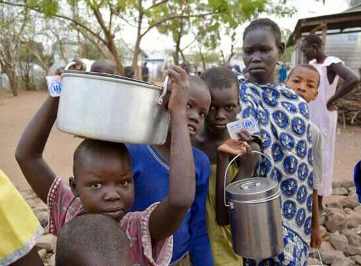UN provides $4.6 million for S. Sudanese refugees in Kenya
March 3, 2014 (NAIROBI) – The UN has announced it will provide $4.6 million to help meet the urgent needs of South Sudanese refugees in Kenya.

An estimated 20,000 South Sudanese have already arrived at Kakuma camp since the outbreak of violence in mid-December, with the number set to increase further.
Hundreds of South Sudanese continue to cross into Kenya daily after a ceasefire deal signed between the country’s leaders and opposition forces in January failed to halt fighting.
Kakuma is the first stop for the refugees when they arrive in Kenya, where they are assessed before being taken for processing and registration.
The majority of new arrivals are women and children, with many walking for days to reach the border where onward transport is available in lorries.
Unaccompanied children and the elderly are also among the new arrivals.
Conditions inside the camp, which has been receiving refugees from South Sudan since 2002, are challenging for the new arrivals, with the area prone to dust storms and extreme heat.
The influx of new refugees has placed a strain on the camp’s already overstretched resources, with provision of health services and shelter remaining problematic.
The UN refugee agency (UNHCR) said water is the most pressing concern, with some of the recently arrived refugees reporting up to 4 days’ wait to collect water, while others sleep in lines at water pumps with their jerry cans.
Hostilities erupted in South Sudan on 15 December, pitting forces loyal to the Salva Kiir-led government against rebels aligned with former vice-president Riek Machar, who was sacked in July.
The ongoing violence has displaced about 900,000 people, including 190,000 people who fled to neighbouring countries, including Kenya.
REFUGEES RELOCATED
At the end of last month, the International Organization for Migration (IOM) began relocating more than 400 South Sudanese refugees from Akobo-Tergol to Pugnido camp in Ethiopia’s Gambella region, 430km away.
The two-day journey included a nine-hour, 130km boat trip and an overnight stay en route.
IOM has relocated about 15,000 people to Western Ethiopia, where two camps have been set up for to accommodate a total of 60,000 South Sudanese asylum seekers.
IOM will also arrange transportation along the same route for ethnic Nuer refugees also stranded in Akobo-Tergol, with separate camps were set up to minimise the potential for tribal conflict.
Refugees at Akobo-Tergol – the main entry point for those fleeing to Ethiopia from South Sudan – told IOM they were facing an increasingly desperate situation, with many getting by on just one meal a day after food assistance ran out.
The IOM has been providing transportation for thousands of South Sudanese refugees fleeing into neighbouring Ethiopia, Kenya and Uganda.
MORE CROSS INTO SUDAN
Meanwhile, the IOM has reported a four-fold increase in the amount of South Sudanese crossing into neighbouring Sudan over the past seven days.
According to the IOM, 2,944 persons (or 421 persons per day) crossed into Sudan last week, up from 677 people (or 97 people per day) in the previous reporting period. Of the latest arrivals, 34% were children.
The figures represent the biggest population movements between the two countries since the conflict began.
IOM said the significant increase in new arrivals is linked to ongoing insecurity in Upper Nile state, where heavy fighting has sparked a fresh wave of displacement.
According to the UNHCR, more than 35,000 people have entered Sudan since mid-December, with the majority crossing into White Nile state.
(ST)
